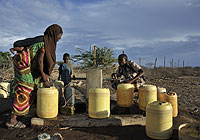Refugees Are Not A Security Threat

Deputy President William Ruto ordered the UNHCR to close the Dadaab refugee camp within three months. This means 335,565 Somali refugees will be required to leave Kenya by end of June or the government will forcibly remove them.
This news was jubilantly received by Kenyans. However few are critically and rationally reviewing the rationale of moving the refugees and its implications.
There are 569,772 refugees in Kenya, the majority being from Somalia, followed by Ethiopia and DR Congo. Most have fled conflict, much like the Kenyan refugees in Uganda who fled the 2007-08 post-election violence.
There has been a lot of talk about refugees, particularly Somalis, being a threat to national security. But is there any evidence of this? In December 2012, the government ordered all refugees residing in urban areas relocated to the camps. The government said they were a security threat and thus needed to be contained in refugee camps. A case was lodged at the High Court to challenge this argument and the government failed to present evidence linking refugees to insecurity.
In December 2014, the government – through the Security Laws Amendment Act 2014 – attempted to limit the number of refugees to 150,000. In another High Court case, the government failed again to prove the causal link between hosting refugees and insecurity.
If there is no evidence linking refugees to the current insecurity, why are they being targeted? The answer to this question lies in the gaps in our security system.
A 2012 Refugee Consortium of Kenya study found that Somali refugees at Dadaab escaped forcible recruitment into al Shabaab. Further, some recruiters followed them to Dadaab. How can al Shabaab access the Dadaab refugee camp without detection?
Granted, the Kenya-Somalia border is porous. However, corruption poses the greater danger to our national security. This is how arms and militia personnel come from Somalia, past government checkpoints, and hit Nairobi’s Westgate Mall and Garissa University College.
Al Shabaab operatives are not the only ones recruiting fighters from the camps. In a 2009 report, KDF was accused of militarising the camp. Young Somali men were recruited to join the Transitional Government Forces fighting al Shabaab at the time. Most of these fighters, with arms and training from the KDF, ended up joining al Shabaab. This demonstrates complacency on the part of the government.
The first and obvious implication of forcibly sending refugees to Somalia is that Kenya would be in violation of its national and international obligation to protect refugees.
Secondly, there is the danger of driving resentful or desperate fresh recruits into the hands of al Shabaab.
Thirdly, it will divert attention from the real issues affecting our security system: corruption and complacency. Kenyans know only too well that billions of shillings have been diverted from public coffers for private gain. This includes security related contracts. Before the Garissa attack, there was huge public outcry over the level of corruption in the internal security docket.
Another monster is the complacency within the security structure. How often have we heard that intelligence on an imminent attack was available and nothing was done to prevent it?
How often have we been regaled by blame games following a terrorist attack? During Westgate it was the lack of coordination that prolonged the siege after KDF shot and killed a Recce squad leader forcing the Recce squad to retreat. Again lack of coordination cost more lives in Garissa where the Recce squad took more than eight hours to arrive at the scene to conduct a 12-minute operation. These lapses, are the major reason the government cannot contain the terror menace.
There are alternatives to forcible repatriation. The first is to officially recognise combating corruption and complacency as key pillars of the counterterrorism strategy.
Secondly, those in the camps recruiting refugees into al Shabaab should be isolated and arrested.
Thirdly, the government should focus more on the voluntary repatriation process already in place. This way, there is little risk of bitterness that may drive refugees into the ranks of al Shabaab.
Source: the-star.co.ke